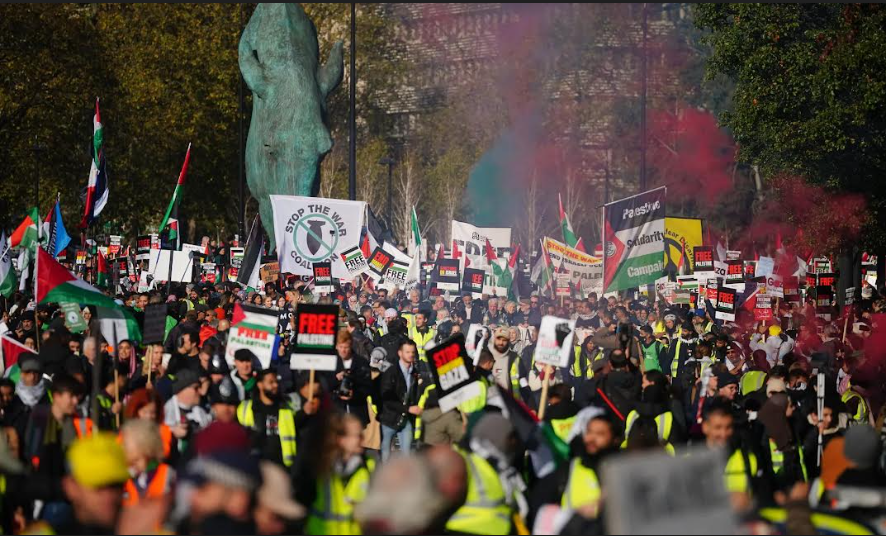Colombo, November 13:
With concern over the plight of Palestinians in Gaza spreading like wildfire across the globe including Western capitals, and with the United States making efforts to contain Israeli aggression, India has changed its pro-Israeli stance on Gaza.
In contrast to its abstention in October, on November 9, India voted in favour of a resolution in the UN General Assembly (UNGA) that condemned Israeli settlement activities in the “Occupied Palestinian Territory”.
The resolution covers all activities such as confiscation of land, disruption of the livelihood of protected persons, and forced transfer of civilians in the occupied territories.
The draft resolution titled ‘Israeli settlements in the Occupied Palestinian Territory, including East Jerusalem, and the occupied Syrian Golan” was approved by the Special Political and Decolonisation Committee (Fourth Committee) of the UN General Assembly by a recorded vote of 145 in favour, seven against and 18 abstentions.
Those voting against the resolution were Canada, Hungary, Israel, Marshall Islands, Federated States of Micronesia, Nauru and the United States.
India was among the 145 nations that voted in favour of the resolution along with Bangladesh, Bhutan, China, France, Japan, Malaysia, Maldives, Russia, South Africa, Sri Lanka, and the U.K.
Though the resolution does not pertain to Gaza, as such, it is bound to rub off on the Gaza issue in due course.
The situation at UNGA in October was different. The 193-member UN General Assembly had met in a resumed 10th Emergency Special Session and voted on a draft resolution submitted by Jordan and co-sponsored by over 40 nations including Bangladesh, Maldives, Pakistan, Russia and South Africa. The resolution titled ‘Protection of civilians and upholding legal and humanitarian obligations’ was adopted with 120 nations voting in favour, 14 against and 45 abstentions.
India was among countries which abstained on the resolution. The others included Australia, Canada, Germany, Japan, Ukraine and the United Kingdom.
In its Explanation of Vote (EOV) after the UNGA resolution, India’s Deputy Permanent Representative to the UN Ambassador Yojna Patel said: “In a world where differences and disputes should be resolved by dialogue, this august body should be deeply concerned at recourse to violence. That too, when it happens on a scale and intensity that is an affront to basic human values.”
Describing the terror attacks in Israel on October 7 as shocking, Patel said they deserve condemnation.
“Terrorism is a malignancy and knows no borders, nationality or race. The world should not buy into any justification of terror acts. Let us keep aside differences, unite and adopt a zero-tolerance approach to terrorism,” she said.
US Warns Israel
However, there has been a sea-change in the mood of the world, including the West, since then. The intellectual class, university faculty and students, Jews and non-Jews, Muslims and non-Muslims demonstrated massively in the capitals of the Western world including Australia, UK and the US, calling for a ceasefire and a halt to the Israeli military offensive in Gaza.
The Biden Administration called for a “Humanitarian Pause” to help relief reach the beleaguered people of Gaza. It expressed fears of the Al Shifa hospital’s becoming the scene of a deadly battle as part of a broader concern over the growing number of civilian casualties in Gaza which has now crossed 11,000 deaths as the war enters the fifth week.
The World Health Organization has managed to get in touch with healthcare workers at Al Shifa hospital. In a statement on Sunday, WHO chief Tedros Ghebreyesus called the situation “dire and perilous”.
“It’s been 3 days without electricity, without water and with very poor internet which has severely impacted our ability to provide essential care. The constant gunfire and bombings in the area have exacerbated the already critical circumstances,” WHO said.
President Biden is under growing pressure from Democrats to change his approach to the Israel-Hamas war. Biden’s National Security Adviser, Jake Sullivan, told CBS on Sunday that the administration is in constant communication with Israel over this issue.
“The United States does not want to see firefights in hospitals, where innocent people, patients receiving medical care, are caught in the crossfire, and we’ve had active consultations with the Israeli Defence Forces on this,” Sullivan said.
But Israel remains unresponsive. It insists that Hamas should first release the 240 hostages it holds before it agrees even to a humanitarian pause, forget about a ceasefire.
IDF Envisages Year-long War
Meanwhile, the Israeli Defence Force (IDF) is reportedly preparing for a year-long war. The idea is to completely eliminate Hamas and set up a government in Gaza without Hamas and the influence of Iran.
The Times of Israel quoted Channel 12 to say that the IDF is expecting to be fighting in Gaza for a year.
“There is no pressure to hurry,” the unsourced report in Channel 12 said. “That is the message army commanders are being told all the time: Work slowly and securely. Bring the results.”
The report says the IDF is “preparing for a period of a year of fighting… in different areas… different methods, but a year of fighting to get to the fourth stage of this war: The entry of a new government in Gaza that is not Hamas and is not backed by the Iranians.”
Meanwhile, Hamas had told the Russians and the Iranians at a meeting in Moscow that it was ready to release the hostages but the problem was to locate each and every one of them as they were scattered. It sought time and a pause in the Israeli military operations.
The Israelis on the other hand believe that any pause will be used by Hamas only to regroup and attack. However, the US and Qatar are working together to break the deadlock.





